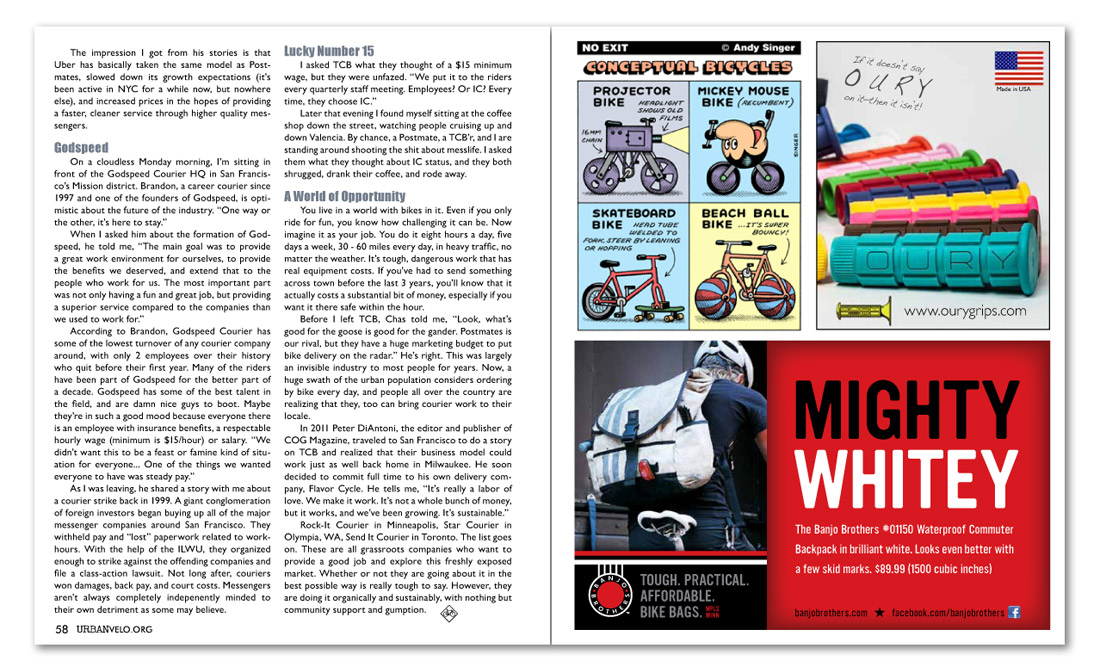


The impression I got from his stories is that Uber has basically taken the same model as Postmates, slowed down its growth expectations (it’s been active in NYC for a while now, but nowhere else), and increased prices in the hopes of providing a faster, cleaner service through higher quality messengers.
Godspeed
On a cloudless Monday morning, I’m sitting in front of the Godspeed Courier HQ in San Francisco’s Mission district. Brandon, a career courier since 1997 and one of the founders of Godspeed, is optimistic about the future of the industry. “One way or the other, it’s here to stay.”
When I asked him about the formation of Godspeed, he told me, “The main goal was to provide a great work environment for ourselves, to provide the benefits we deserved, and extend that to the people who work for us. The most important part was not only having a fun and great job, but providing a superior service compared to the companies than we used to work for.”
According to Brandon, Godspeed Courier has some of the lowest turnover of any courier company around, with only 2 employees over their history who quit before their first year. Many of the riders have been part of Godspeed for the better part of a decade. Godspeed has some of the best talent in the field, and are damn nice guys to boot. Maybe they’re in such a good mood because everyone there is an employee with insurance benefits, a respectable hourly wage (minimum is $15/hour) or salary. “We didn’t want this to be a feast or famine kind of situation for everyone... One of the things we wanted everyone to have was steady pay.”
As I was leaving, he shared a story with me about a courier strike back in 1999. A giant conglomeration of foreign investors began buying up all of the major messenger companies around San Francisco. They withheld pay and “lost” paperwork related to work-hours. With the help of the ILWU, they organized enough to strike against the offending companies and file a class-action lawsuit. Not long after, couriers won damages, back pay, and court costs. Messengers aren’t always completely indepenently minded to their own detriment as some may believe.
Lucky Number 15
I asked TCB what they thought of a $15 minimum wage, but they were unfazed. “We put it to the riders every quarterly staff meeting. Employees? Or IC? Every time, they choose IC.”
Later that evening I found myself sitting at the coffee shop down the street, watching people cruising up and down Valencia. By chance, a Postmate, a TCB’r, and I are standing around shooting the shit about messlife. I asked them what they thought about IC status, and they both shrugged, drank their coffee, and rode away.
A World of Opportunity
You live in a world with bikes in it. Even if you only ride for fun, you know how challenging it can be. Now imagine it as your job. You do it eight hours a day, five days a week, 30 - 60 miles every day, in heavy traffic, no matter the weather. It’s tough, dangerous work that has real equipment costs. If you’ve had to send something across town before the last 3 years, you’ll know that it actually costs a substantial bit of money, especially if you want it there safe within the hour.
Before I left TCB, Chas told me, “Look, what’s good for the goose is good for the gander. Postmates is our rival, but they have a huge marketing budget to put bike delivery on the radar.” He’s right. This was largely an invisible industry to most people for years. Now, a huge swath of the urban population considers ordering by bike every day, and people all over the country are realizing that they, too can bring courier work to their locale.
In 2011 Peter DiAntoni, the editor and publisher of COG Magazine, traveled to San Francisco to do a story on TCB and realized that their business model could work just as well back home in Milwaukee. He soon decided to commit full time to his own delivery company, Flavor Cycle. He tells me, “It’s really a labor of love. We make it work. It’s not a whole bunch of money, but it works, and we’ve been growing. It’s sustainable.”
Rock-It Courier in Minneapolis, Star Courier in Olympia, WA, Send It Courier in Toronto. The list goes on. These are all grassroots companies who want to provide a good job and explore this freshly exposed market. Whether or not they are going about it in the best possible way is really tough to say. However, they are doing it organically and sustainably, with nothing but community support and gumption.